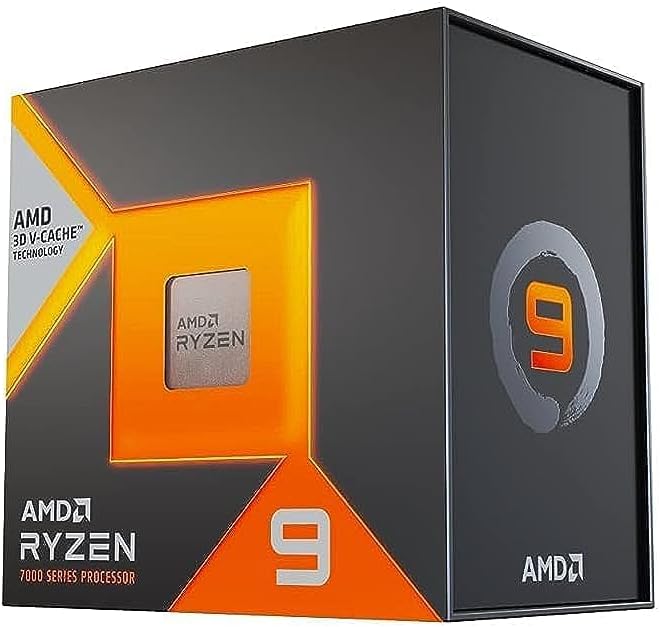About this deal
And this test highlights that even at 1440p the extra L3 cache of the 7950X3D tangibly makes a difference to the gaming performance of the system at the highest graphical presets. But, as always, at 4K it's all about the GPU. Metro is the only benchmark that displays some difference between the three chips attached to the RTX 4090, and then that's more down to some vagaries in optimisation and drivers. If the game prefers frequency over cache, it should run primarily on the frequency CCD. (less games, notable examples CS:GO, Football Manager, etc) You also really can't discount the performance-per-watt that you're getting with the Ryzen 9 7950X3D, which is at least twice what you'd get with the Intel Core i9-13900K and about 55% better than the 7950X. When it comes to the synthetic benchmarks, there's very little difference between the 7950X3D and the 7950X. Both chips are phenomenal multitaskers, and though the 7950X has consistently stronger single core scores than the 7950X3D, the 7950X3D performs better with multi core performance than its non-3D V-Cache counterpart. If the CPU utilisation gets high enough, you may find that one or more cores on the inactive CCD wake up and become active and begin work. This is normal and expected and exactly how the CPU is designed. It offers extra performance vs keeping highly utilised cores to one CCD, which is what happens to those poor folks using Process Lasso. People that advocate for apps like Process Lasso often think this is a bug and it hurts performance, it doesn't, It helps performance. Thoroughly tested on a 4090 and a 7900 XTX over many games and settings.
The tuned setting did deliver higher performance, but only in the same way you can tune an F1 car to run above tolerances only to explode as it crosses the finish line. I could catch some higher benchmark numbers, but the system was in no way stable. While prices are high, we were very impressed by the Ryzen 9 7950X3D in our review, praising it for its high performance and low power draw. You can read our full review, HERE.
A chip that delivers on the title of best gaming CPU better than any I've tested before, but it's not quite the one chip to do it all.
The score in 3DMark obtained by the Ryzen 9 7950X3D is slightly lower than the one obtained by the Ryzen 9 7950X, but by so slim of a margin that it's essentially a tie. These two chips tie in other tests as well but, in F1 22, the Ryzen 9 7950X3D holds a decisive advantage over its similarly named counterpart while also narrowly passing the Intel competition. Testing a processor is arguably one of the most involved processes of any component I review because there are so many things to measure and quantify. The chipset drivers also install the AMD PPM Provisioning File Driver, which improves performance by parking the slowest cores when Game Mode or Mixed Reality Mode is active. In effect, this shuts down the ‘standard’ CCD when Game Mode or Mixed Reality Mode is active, thus constraining latency-sensitive workloads (like games) to the 3D V-Cache chiplet. This improves the cache hit rate and reduces high-latency communication between the two CCDs, resulting in faster performance for workloads that don’t need access to (or benefit from) all the cores.
It's simply the best gaming CPU by performance you can buy on the consumer market and that's not likely to change for the rest of this processor generation, at the very least. Quite simply, AMD does so much more with far less power than either of the competing flagship processors, and you don't have to accept lower performance as a tradeoff. Much more often than not, you're getting a substantially faster processor in practice — especially for gaming — making it very hard to deny the AMD Ryzen 9 7950X3D its due. If we're talking about this being AMD's take on the perfect gaming processor, we need to step outside of the 1080p gaming environment. We traditionally test at this lower resolution for our CPU game benchmarking so we are able to highlight the difference in performance down to the actual processors. As you go higher in the resolution scale you end up relying ever more on the power of the graphics card, to the point where you cease being able to discern meaningful performance deltas between chip architectures.
Perform a clean installation of Windows. Things will work better rather than using an old OS that was used for a different CPU. This bit is important, so don't overlook it, otherwise you might need to use something like Process Lasso. I recommend the latest Windows 11 22H2 build, which I use with my 7950X3D. I've tested Windows 10 vs 11, and 11 is clearly faster in gaming so if you are on 10 take this into consideration. On the other hand, when a game like Total War: Warhammer III is running, energy efficiency on the 13900K goes right out the window and you start getting power draw above 330W just for the processor. This allows the 13900K to eke out up to 68 more fps than the 7950X3D (or 532 minimum fps for the 13900K to the 7950X3D's 464 minimum fps), but it literally needs almost 2.5 times as much power to accomplish this. If the software detects a certain high level of thread utilisation, however, it will spin up that dormant chiplet and bring it online if its extra core count is needed.
 Great Deal
Great Deal 